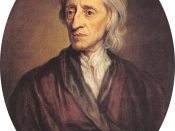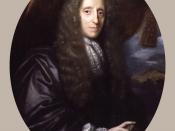Edmund Burke had traditional conservative views. He said that because of the profound tendency
toward irrational behaviour on the part of humans, guidance and direction from traditional
authorities is needed in order for society to enjoy peace and stability.
He argued that traditional authorities should pass on long-standing moral teachings through the
family, religious institutions, and governmental laws; and insisted that compliance with traditional
morality is more important than individual liberty. In other words, people should not have the
freedom to violate moral precepts.
Thomas Paine's own faith was centred in the belief of an eternally existing God and of a universe
governed by law, while his religion was summarised in his famous sentence: My country is the
world, and my religion is to do good. As his religion transcended the formal professions of any cult
or sect, he refused to accept the creed of any church. "My mind is my church" he said, "and
churches are but human inventions, set up to enslave mankind and monopolise power and profit."
Due to these beliefs he was called an infidel, even though he believed in God.
French philosopher Jean-Jacques Rousseau believed that ancient conceptions of human nature were
incorrect and a barrier to human happiness. Human beings were born good. What makes them bad
is an artificial, corrupt and depraved society. If human beings at birth were given freedom from
society's corrupt influences, they would grow up to be good, noble, unselfish, cooperative, and
possess all other human virtues.
Thomas Hobbes depicted human nature as violent and warlike in his 17th century work Leviathan.
Life is uncertain, he said, because of the human tendency to commit innumerable acts of aggression
against persons and property. Thus, without a strong state to control these aggressive tendencies,
violence becomes a way of life.
John Locke was an English philosopher who is often credited with being the originator of liberalism.
According to Locke, what we learn from a study of the state of nature is that human nature is
characterised by freedom, equality and reason. Humans are naturally free, born with the duty to
submit to no one. That is, there are no natural rulers to whom we owe obedience in the state of
nature. On the contrary, each person is naturally equal to others, according to Locke. Each person is
born equally free and equally in possession of certain natural rights (natural rights are rights we have
just by virtue of being human). These rights are an element of our natural human nature. Locke
believed that our natural rights include the right to life, liberty, and property. Insofar as each of us is
equally human, each of us has an equal claim to enjoy these rights freely. His laws of nature were:
* Preserve yourself. Take care of yourself and your needs. Work to promote your own survival.
* Do not harm others. Do not seek out trouble by starting conflicts and wars. If you do seek to
harm others, this will put you at risk of being harmed and will thus violate the first law of
nature.
* Help others if possible. Help others if you can help them without putting yourself at risk.
And through his laws of nature comes to an important conclusion: People are capable of running
their own lives because they have common sense.


